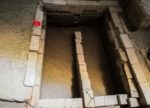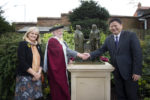 Archaeologists excavating the site of a demolished factory in Fuzhou, Jiangxi Province, east China, have discovered the tomb of Ming Dynasty (1368-1644) playwright Tang Xianzu (1550-1616). A large grouping of tombs was first unearthed after the demolition of the old plant last year, 42 of them in total, 40 dating to the Ming Dynasty. Tomb M4 was identified as Tang’s from an epitaph, one of six found at the site some of which are believed to have been written by the playwright himself. His third wife Fu was buried with him in the tomb; his second wife Zhao was buried in the neighboring tomb labelled M3.
Archaeologists excavating the site of a demolished factory in Fuzhou, Jiangxi Province, east China, have discovered the tomb of Ming Dynasty (1368-1644) playwright Tang Xianzu (1550-1616). A large grouping of tombs was first unearthed after the demolition of the old plant last year, 42 of them in total, 40 dating to the Ming Dynasty. Tomb M4 was identified as Tang’s from an epitaph, one of six found at the site some of which are believed to have been written by the playwright himself. His third wife Fu was buried with him in the tomb; his second wife Zhao was buried in the neighboring tomb labelled M3.
“The epitaphs can help us learn more about the calligraphy, art and literature in Tang’s time,” Xu [Changqing, head of Jiangxi Provincial Cultural Relics and Archeology Research Institute,] said.[…]
“This discovery is significant, because it tells us more about Tang’s life, his family tree and relationships with other family members,” said Mao Peiqi, vice chairman of the Chinese Society on Ming Dynasty History.
“Besides, by learning about the status and lives of Tang’s family, we can learn about education, culture and agriculture in the Ming Dynasty as well as the development of society,” he said.
Tang’s best known works are a series of plays known as the Four Dreams. One of them, The Peony Pavilion, is considered his masterpiece. It was the most popular play of the Ming Dynasty and continued to be performed in the classical Chinese opera tradition uninterrupted for hundreds of years until the present. Updated, experimental versions as well as the traditional style have been performed all over the world. There are references to it in popular music, novels, television and film.
 Tang Xianzu and William Shakespeare died the same day: April 23rd, 1616. They had other things in common: exceptional lyrical qualities in their verse, themes of star-crossed romance, plot-driving dreams, ghosts, comical elements combined with the tragic and dramatic, historical settings and personages, and legacies as literary giants that loom large in their native countries and beyond. Because they were contemporaries with such enduring cultural influence, comparisons between Tang and Shakespeare are rife. Tang is often referred to as the Chinese Shakespeare as shorthand to explain the enormity of his importance in Chinese theatrical history. Last year, the 400th anniversary of both men’s deaths, The Peony Pavilion was performed at Stratford-upon-Avon, birthplace of the Bard. This year, a statue of the two great playwrights standing side by side gifted to the Shakespeare Birthplace Trust by the city of Fuzhou in 2015 was unveiled in the garden at Shakespeare’s Birthplace in Stratford-upon-Avon.
Tang Xianzu and William Shakespeare died the same day: April 23rd, 1616. They had other things in common: exceptional lyrical qualities in their verse, themes of star-crossed romance, plot-driving dreams, ghosts, comical elements combined with the tragic and dramatic, historical settings and personages, and legacies as literary giants that loom large in their native countries and beyond. Because they were contemporaries with such enduring cultural influence, comparisons between Tang and Shakespeare are rife. Tang is often referred to as the Chinese Shakespeare as shorthand to explain the enormity of his importance in Chinese theatrical history. Last year, the 400th anniversary of both men’s deaths, The Peony Pavilion was performed at Stratford-upon-Avon, birthplace of the Bard. This year, a statue of the two great playwrights standing side by side gifted to the Shakespeare Birthplace Trust by the city of Fuzhou in 2015 was unveiled in the garden at Shakespeare’s Birthplace in Stratford-upon-Avon.
 The discovery of Tang’s tomb is exciting not just for what it can tell us about his personal life, Ming Dynasty history and culture, but also because until now there was no commemorative location linked to his life for his myriad fans to visit to pay their respects. An empty tomb was built in a Fuzhou park in the 1980s just so there’d at least be some kind of monument. Now the city plans to create a destination site where Tang Xianzu and his family were really buried that will attract tourists, fans, artists and scholars alike.
The discovery of Tang’s tomb is exciting not just for what it can tell us about his personal life, Ming Dynasty history and culture, but also because until now there was no commemorative location linked to his life for his myriad fans to visit to pay their respects. An empty tomb was built in a Fuzhou park in the 1980s just so there’d at least be some kind of monument. Now the city plans to create a destination site where Tang Xianzu and his family were really buried that will attract tourists, fans, artists and scholars alike.
‘China’s Shakespeare’ basically says that Tang cannot be better than Bill. If he was a brilliant playwright, a giant to step on the stage, then why can we not just say so?
Will, the ‘Tang of Avon’, and Xianzu.
Several years ago, I delivered a power plant to Fuzhou: Those thousands of pages export documents were true compositions, but there were no sonnets involved: “A power plant! A power plant! A sonnet for a power plant!”
To perform the complete Peony Pavilion itself can easily last for more than 20 hours (!) :hattip:
I like the statues. I hope that the current fashion for destroying statues doesn’t reach them. No doubt something each wrote can be twisted around to demonstrate how very non-PC he was.
Great post! I love your blog :boogie:
So did they erect a similar statue of Shakespeare in Fuzhou?